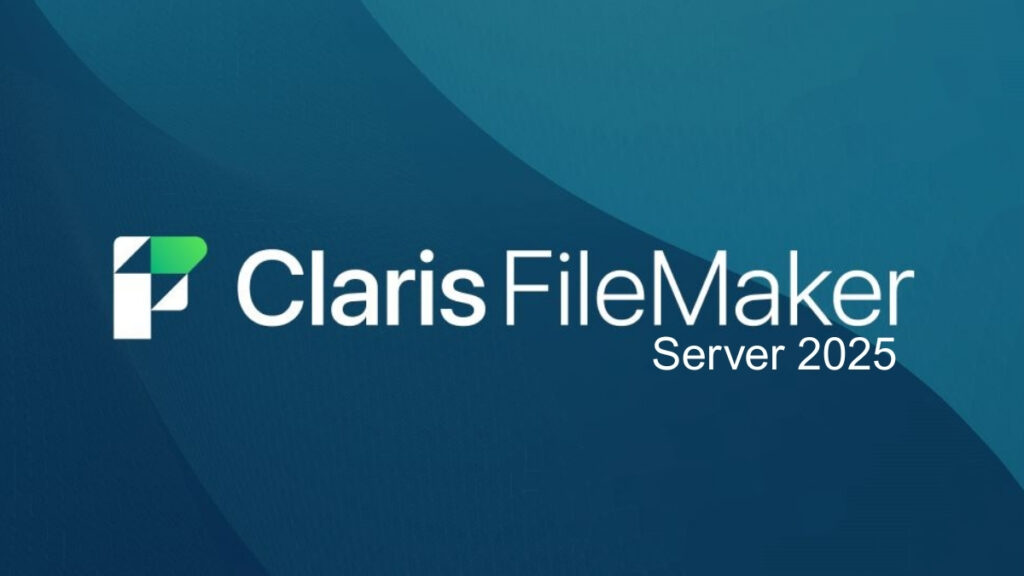We’re wrapping up our three-part series on the latest Claris updates with a look at the new features in FileMaker Server. Version 22 brings a range of improvements from AI model hosting to easier management.
If you missed our earlier posts, you can find them here:
- Part 1: New Non-AI Features
- Part 2: New AI Features
AI Model Server
One of the headline additions to FileMaker Server (FMS) is the AI Model Server, now built directly into FMS. The AI Model Server (previously referred to as the open source model server) allows administrators to:
- Start and stop the server,
- View status,
- Create and manage API keys,
- List available models,
- Enable or disable models,
- Configure settings
- Add or download models with acknowledgment, and
- Remove models with confirmation.
The AI Model Server also supports retrieval-augmented generation (RAG), letting you store and search through your own PDFs and text files.
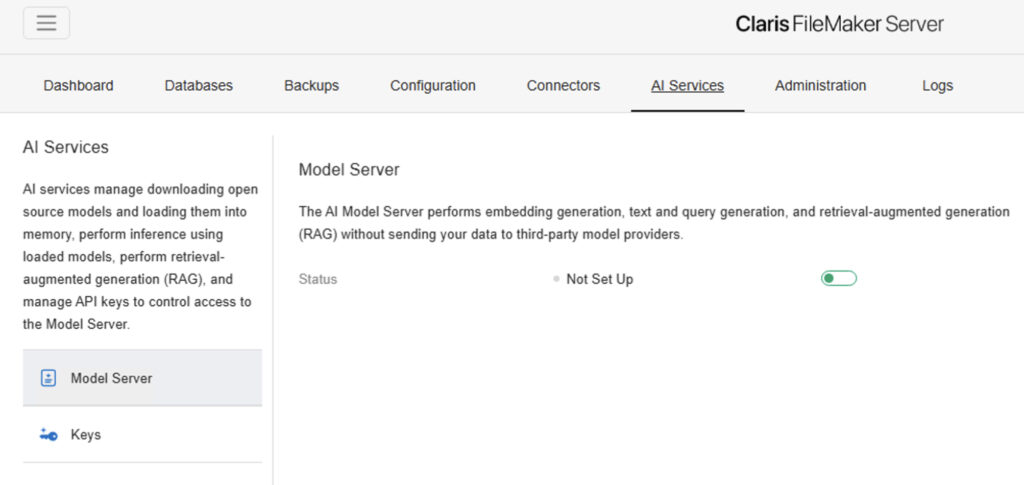
When you first turn on the AI Model Server, you will be guided to install Miniforge, after which all of the necessary Python packages and dependencies will be installed automatically.
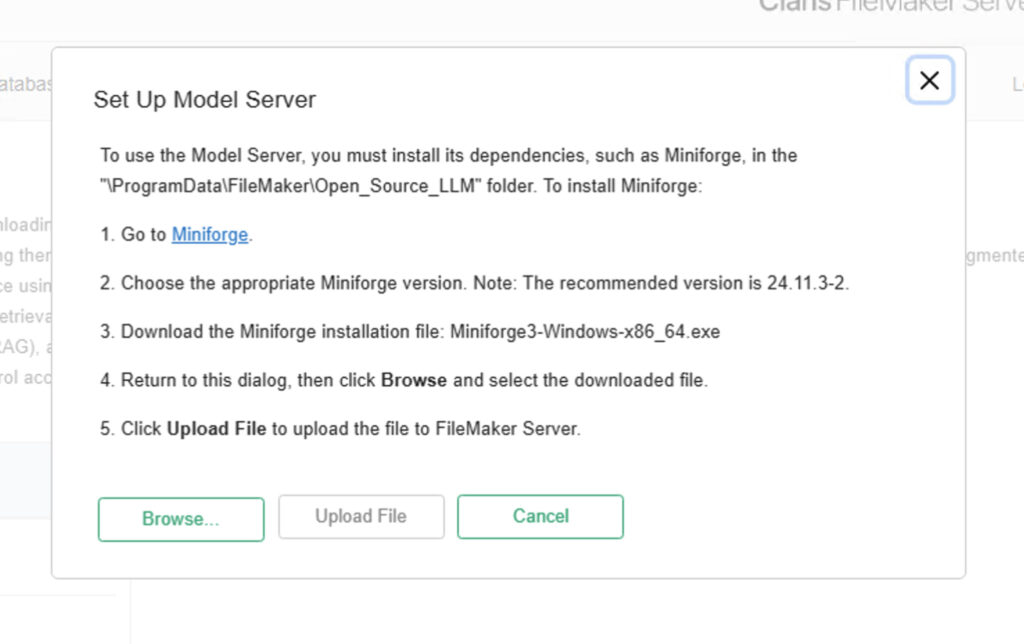
Claris has provided some recommendations for running an AI Server, the most important of which is to use a dedicated machine for best performance. For more information, refer to this post.
Why it matters: Running models inside FileMaker Server means you control both performance and compliance. Instead of sending sensitive data to third-party cloud services, you can fine-tune models on your own infrastructure. This gives organizations—from medical clinics to legal practices—confidence that AI-powered search and summarization can be deployed without compromising data governance.
Claris Studio Access to FileMaker Data
FileMaker data can now be shared directly with Claris Studio views. Previously, data sources had to be created in Claris Studio and appeared as Shadow tables within FileMaker. Now existing FileMaker Server–hosted apps can act as the back end for interactive dashboards, customer-facing portals, or data collection forms.
We did a full review of the new features in Claris Studio and Connect here.
To set up Claris Studio to access FileMaker data, your app must be hosted with FileMaker Server 2025, and the FileMaker Data API and OData must be enabled on the server and in the app’s extended privileges.
Why it Matters. Being able to directly connect data from FileMaker to Claris Studio provides tighter integration between these platform tools and reduces the need for custom web portals. The latest Studio update provides a significant bonus that not only allows anonymous users to view data but also allows externally authenticated users to interact with FileMaker data.
Admin Console Enhancements
Server admins get a few helpful new tools:
- Flush database pages for a single file or all files on demand.
- Limit simultaneous script sessions* on Windows using the FileMaker Script Engine (FMSE).
*This setting is separate from the maximum script session number in CLI server configuration and allows administrators to optimize performance based on CPU-bound or I/O-bound workloads.
Why It Matters. These updates give administrators more control without needing to use the command line. The ability to flush individual files helps during troubleshooting and backups, and adjusting FMSE sessions lets admins tune the server for different workloads—whether they are script-heavy or data-entry heavy.
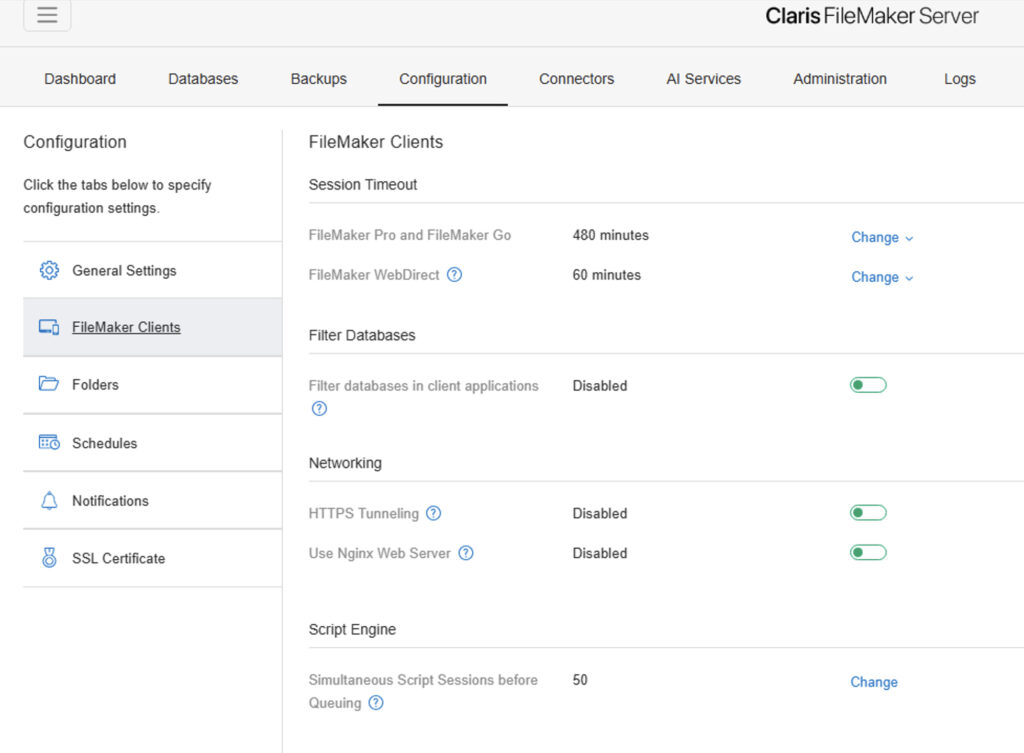
FileMaker Upgrade and Developer Tools
The FileMaker Upgrade Tool is now included with the FileMaker Server installer, allowing administrators to perform file upgrades directly on the server. There are no standalone downloads for any of the included tools. Additionally, the tool has been updated with a few enhancements:
- AddAction adds support for layout objects, format options for number fields, date options for date and timestamp fields, and time options for time and timestamp fields.
- ReplaceAction adds support for scripts, script steps, base tables, fields, table occurrences, relationships, value lists, custom functions, custom menus, custom menu sets, accounts, privilege sets, extended privileges, external data sources, themes, and base directories (for externally stored container field data).
- Patch application logic uses cascading fallback when searching for matching catalog members:
- search by name and ID together
- search by UUID
- search by name only
- DeleteAction and ReplaceAction both now search for UUIDs and fall back to SourceUUID if no match is found.
The Developer Tool has the following enhancements:
- SaveAsXML supports Include details for analysis tool option
- Reset File UUID added to the command line.
The FileMaker Upgrade, Developer, and Data Migration tools now support loading plug-ins.
Why it matters. The improved patch logic reduces upgrade risks by handling schema mismatches more gracefully. Developers benefit from better analysis tools, and plug-in support across migration and upgrade utilities means fewer surprises when moving files between versions.
Let’s Encrypt Integration
SSL certificate management has historically been one of the biggest headaches for FileMaker Server administrators. With the release of FMS 2025, SSL certificate management is now much easier. Let’s Encrypt is fully integrated into Admin Console, allowing users to:
- Request and renew certificates automatically,
- Schedule automatic renewals,
- Manage certificates for multi-machine deployments, and
- Benefit from improved security (port 80 is only opened temporarily during verification).
Why it matters: For many teams, these updates eliminate the need to manually generate, install, and renew certificates—a process that has traditionally been a pain point. Secure connections are now essentially one-click, saving hours of manual certificate management. Automated renewals reduce the chance of downtime due to expired certificates.
WebDirect Improvements
WebDirect gains two quality-of-life updates that make it feel more like a native app:
- Session protection: If a user has unsaved changes, they’ll now get a warning before navigating away or closing the browser tab.
Right-click contextual menus: Common actions like copy, paste, or choosing from drop-down lists are now supported.
Why it Matters. UI improvements are always helpful. When WebDirect behaves more like the desktop client, users require less training and are less likely to make mistakes. Small enhancements translate into fewer lost changes, less frustration, and smoother adoption of web-based workflows.
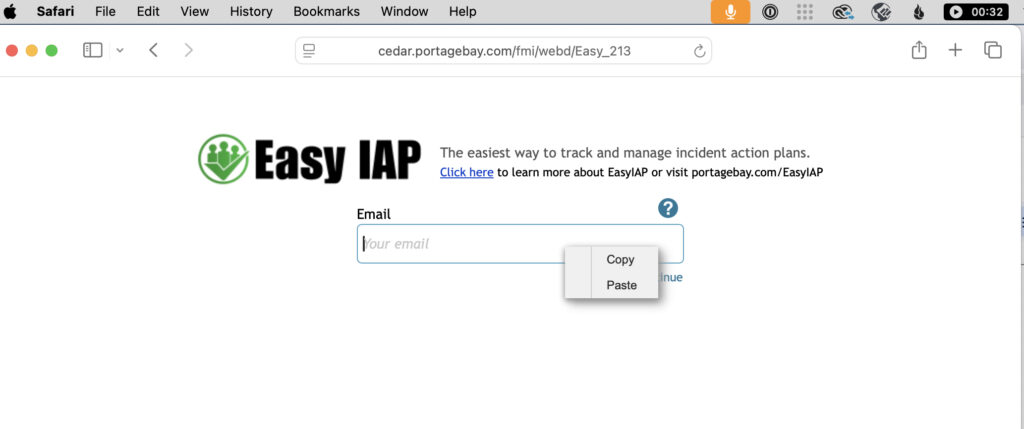

OData Improvements
OData support continues to expand:
- Better container support with accurate MIME mapping.
- Custom filenames are preserved for binary uploads.
- Certificate signing now uses SHA256 for improved security
- Aggregation extensions support has been added, including the $apply system query option, aggregate transformations (AS), standard aggregation methods (SUM, MIN, MAX, AVERAGE, COUNTDISTINCT), and GROUPBY transformations.
- Value List items can be exported by associating fields with value lists through validation rules, with custom field annotations indicating value list associations, and automatically generated tables for custom value lists
Why it matters. Updates to OData bring FileMaker’s APIs closer to full SQL-style functionality, reducing the need for complex workarounds. Expanding OData makes it easier to use external business intelligence tools such as Power BI or Tableau with FileMaker. Native aggregation functions reduce the need for intermediate scripts or summary tables, speeding up reporting and lowering the barrier to advanced analytics.
Security Updates
Security continues to tighten with each release:
- FileMaker Server 2025 blocks connections from Pro/Go clients earlier than 21.0.1.
- Enhanced protection against denial-of-service attacks.
- Optimized OpenSSL settings improve cryptographic performance.
- Admin Console now requires confirmation before clearing encryption passwords.
- In the Open Encrypted Database dialog, the Save Password checkbox is now selected by default.
Why it matters. Security is an area of development that is critical in changing times. These updates provide significant improvements and fail-safes to help administrators lock down the server and optimize performance. Blocking outdated clients ensures everyone is on a secure baseline, reducing vulnerabilities. Combined with stronger DoS protections and OpenSSL optimizations, these updates mean administrators spend less time worrying about threats and more time focusing on solution performance.
Additional Updates
SQL and ODBC/JBDC Updates
- Value list export via SQL using two new system tables,
- Syntax support for SQL ALTER TABLE, RENAME TO, and RENAME COLUMN, and
- Syntax support for CREATE TABLE with FEWER_FOLDERS keyword.
FileMaker Admin API
- Supports managing the Allow Set Error Capture setting
- /validateSession endpoint now returns the isSessionInUse parameter (true when the session is in use and false when the session is idle).
- Endpoints for managing Custom Homepage settings: enable, disable, and configure custom home URLs programmatically.
Platform and Deployment Support
- Nginx can now be independently enabled on a Windows Server, allowing Nginx for FileMaker WebDirect to run while keeping HTTP Tunneling disabled.
- Ubuntu 24.04 LTS is now supported.
- Docker on Ubuntu 24.04 is officially supported for containerized deployments.
- Microsoft Entra ID replaces references to Azure AD.
Logging
- Large numbers of /fmi/admin/internal/v1/dbs-notification/ entries in the stdout log have been suppressed to improve log readability.
Updated Libraries and Packages
- date 3.0.3
- ImageMagick 7.1.1-43
- International Components for Unicode (ICU) 76.1
- Java Web Publishing Core (JWPC) Tomcat
- JSON Web Token C++ library (jwtcpp) 0.7.0
- Libevent 2.1.12
- libxml2 2.13.5 and libxslt 1.1.42
- PDF-Writer 4.6.6
- Skia 126
- Thrift 0.21.0
- Vaadin 8.27.7
- ZBar 0.23.93
Final Thoughts
FileMaker Server 2025 rounds out the platform’s latest version with features that make it more secure and easier to administer. While FileMaker Server updates aren’t exactly glamorous, there are certainly some great enhancements that will make your life easier.
Important note: Only FileMaker Pro 21.0.1 and later are supported as clients for FileMaker Server 2025. If you have users on older versions, they’ll need to update before connecting.
For a full list of updates, see the official FileMaker Server release notes.
At Portage Bay Solutions, we’re already piloting several of these features with clients, from WebDirect rollouts that feel smoother for end users to AI-powered document lookups that respect privacy and compliance requirements.If you’d like to explore what FileMaker Server 2025 can bring to your business, get in touch with us.
This piece represents a collaboration between the human authors and AI technologies, which assisted in both drafting and refinement. The authors maintain full responsibility for the final content.
